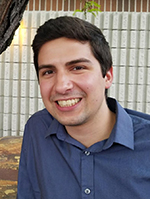Using Biotech to Change the World
Current Northwestern MBP student William Minor shares why he chose the program and how he thinks it can help prepare him to develop life-changing innovations.
When William Minor was in high school, he knew he wanted to be involved in biotechnology in some way. He felt he could play an integral part in designing and developing novel innovations that could potentially improve the world.
 He attended the University of Notre Dame, where he majored in chemical engineering with a concentration in biomolecular engineering. After graduating, he came to Northwestern for its Master of Biotechnology program (MBP).
He attended the University of Notre Dame, where he majored in chemical engineering with a concentration in biomolecular engineering. After graduating, he came to Northwestern for its Master of Biotechnology program (MBP).
Now into his second quarter in the program, Minor took a few minutes to talk about why Northwestern's MBP appealed to him and how he thinks it will help prepare him to reach his goal of changing the world through biotech.
What was it about MBP that appealed to you?
What appealed most to me about MBP was its emphasis on industry readiness and gaining a full perspective. I could tell from the website that this wasn't a master’s program where you simply took classes and got a degree. The emphasis on concurrently building science, engineering, and business acumen greatly appealed to me. The Bioprocess and Bioseparations classes in particular really sold me on the program. I was looking for experience with both upstream and downstream biomanufacturing at the time, and these classes seemed like an ideal fit for me.
Overall, MBP showed that they put great emphasis on evolving the program and keeping it cutting edge. I think for anyone interested in pivoting into R&D or Process Development, this program is an ideal fit.
What is it that you want to do professionally?
The answer to this question is actually evolving as I participate in this program. Biotech has the power to change the world, and I’d like to be on the frontlines. In college, my goal was to pursue a process development or R&D role in an innovative biotech company. Last quarter greatly expanded my understanding of the regulatory and market environment for the biotech industry. Now, I’m exploring opportunities in the biotech industry that involve R&D and/or business strategy.
How do you think MBP will prepare you for that?
The core engineering classes will provide me with all of the biomanufacturing knowledge that I need and my research project and science courses will give me a strong understanding of the molecular and genetic basis for biotech. The other industry insight and soft skill classes will help me to become an industry leader.
How important was MBP's research requirement — specifically the 1,000 hours — in your decision to attend Northwestern?
It was an important part of my decision. I had experience in various research labs throughout my undergraduate experience but never in exactly what I wanted to do. I liked how I had the opportunity to choose and join a lab where I can dive deep and innovate in an area of my interest.
How would you describe your first quarter in the program?
I would describe it as enlightening and robust. The first quarter expanded my understanding of the biotech industry tenfold. Through Tech Commercialization and my elective, NUvention Therapeutics, I gained a new and enhanced perspective on the industry, whereas the advanced molecular biology course that I took gave me deep insight in the molecular and genetic basis for biotech.
What were one or two highlights from your first quarter?
My term project for Tech Commercialization and the MBP molecular biology mini sessions were some great highlights. The Tech Commercialization project was a great experience because it helped me to apply all of the biotech industry knowledge that I gained from my classes and apply it directly on creating a forecast model and value proposition for the prostate cancer drug, Topsalysin, potentially the first biologic therapeutic for the affliction. This project pushed me to think like an MBA and helped to foster my burgeoning interest in business strategy for therapeutics development.
Another highlight was the molecular biology mini sessions with Professor Richard Gaber that proved invaluable with the transition from an engineering mindset to that of a biologist. Professor Gaber is undoubtedly the greatest lecturer I have ever had the pleasure of being taught by. His clear explanations fostered new connections within the source material in distinct ways that greatly increased my knowledge takeaways from the class.
What surprised you during your first quarter in the program?
What surprised me about the first quarter was the sheer breadth of information that I was able to incorporate into my professional being within 10 short weeks. I feel like my understanding of my industry of interest has expanded in such a profound way that what I knew before seems to be pittance. It truly is incredible how well laid out this program is and how you are able to learn not only about a wide variety of focused aspects of the industry, but in a surprising amount of depth for such a short time.

